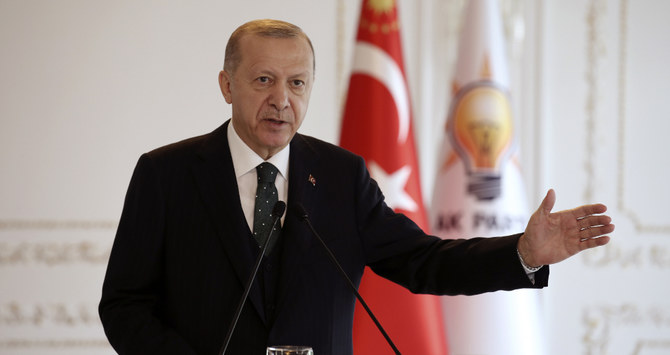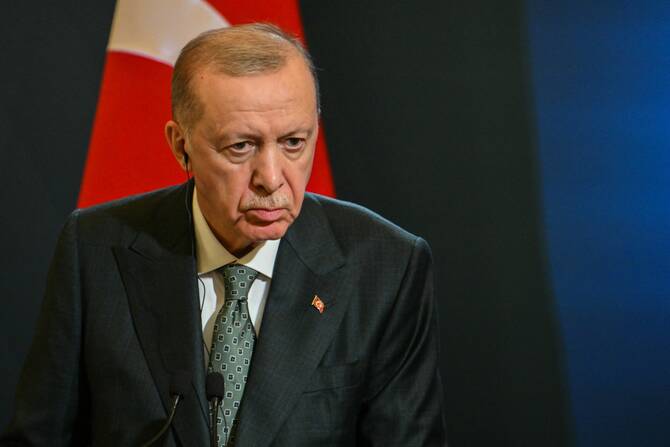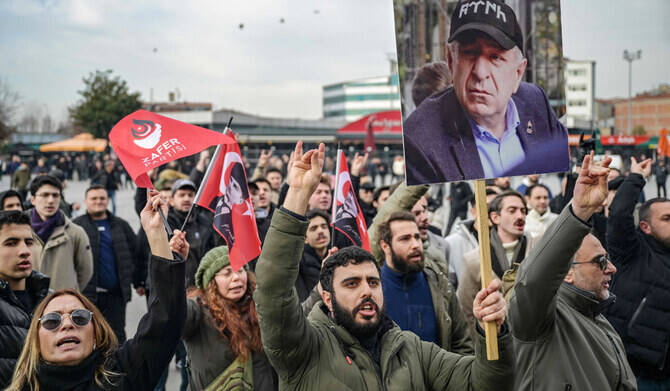ANKARA: Turkish President Recep Tayyip Erdogan denied the country has a “Kurdish issue,” even as he doubled down on his anti-Kurdish stance and accused a politician of being a “terrorist who has blood on his hands.”
Erdogan was addressing members of his ruling Justice and Development Party (AKP) on Nov. 25 when he made the remarks.
The Kurdistan Workers Party (PKK) launched an insurgency against the state in 1984, and is designated a terrorist group by Turkey, the European Union and US. Erdogan accuses the pro-Kurdish Peoples’ Democratic Party (HDP) of links to the PKK, which it denies.
Erdogan told AKP members that Selahattin Demirtas, the HDP’s former co-chair who challenged him in the 2015 presidential elections, was a “terrorist who has blood on his hands.”
Demirtas has been behind bars since Nov. 4, 2016, despite court orders calling for his release and faces hundreds of years in prison over charges related to the outlawed PKK.
The president defended the removal of 59 out of 65 elected Kurdish mayors from their posts in the country’s Kurdish-majority southeast region since local elections in March 2019.
He also said the AKP would design and implement democratization reforms with its nationalistic coalition partner, which is known for its anti-Kurdish credentials.
His words are likely to disrupt the peace efforts that Turkey has been making with its Kurdish community for years, although they have been baby steps. They could also hint at a tougher policy shift against Kurds in Syria and Iraq.
According to Oxford University Middle East analyst Samuel Ramani, Erdogan’s comments should be read as a reaction to Tuesday’s resignation of top presidential aide Bulent Arinc, who urged for Demirtas to be released and insisted that the Kurds were repressed within Turkey.
“This gained widespread coverage in the Kurdish media, including in Iraqi Kurdistan’s outlet Rudaw which has international viewership,” he told Arab News. “Erdogan wanted to stop speculation on this issue.”
Ramani said that Erdogan’s lack of sensitivity to the Kurdish issue could inflame tensions with Kurds in Syria and Iraq.
“It is also an oblique warning to US President-elect Joe Biden not to try to interfere in Turkish politics by raising the treatment of Kurds within Turkey.”
But Erdogan’s comments would matter little in the long run, he added.
“Much more will depend on whether Turkey mounts another Operation Peace Spring-style offensive in northern Syria, which is a growing possibility. If that occurs during the Trump to Biden transition period, the incoming Biden administration could be more critical of Turkey and convert its rhetoric on solidarity with the Kurds into action.”
The Kurdish-led Syrian Democratic Forces have been a key partner for the US in its fight against Daesh. During a campaign speech in Oct. 2019, Biden criticized the US decision to withdraw from Syria as a “complete failure” that would leave Syrian Kurds open to aggression from Turkey.
“It’s more insidious than the betrayal of our brave Kurdish partners, it’s more dangerous than taking the boot off the neck of ISIS,” Biden said at the time.
UK-based analyst Bill Park said that Erdogan was increasingly influenced by his coalition partners, the Nationalist Movement Party (MHP).
“He might also believe that both the PKK and the HDP have been so weakened that he doesn’t have to take them into consideration,” he told Arab News. “The Western world will not respond dramatically to this announcement but they are tired of Erdogan. There is little hope that Turkey’s relations with the US or the EU can be much improved. The Syrian Kurdish PYD militia are seeking an accommodation with Damascus, while the Kurdistan Democratic Party, the largest party in Iraqi Kurdistan, is indifferent to the fate of Turkey’s Kurds and has problems of its own.”
The HDP, meanwhile, is skeptical about Erdogan’s reform pledges and sees them as “politicking.”
“This reform narrative is not sincere,” said HDP lawmaker Meral Danis Bestas, according to a Reuters news agency report. “This is a party which has been in power for 18 years and which has until now totally trampled on the law. It has one aim: To win back the support which has been lost.”
Turkey’s next election is scheduled for 2023, unless there is a snap election in a year.






















